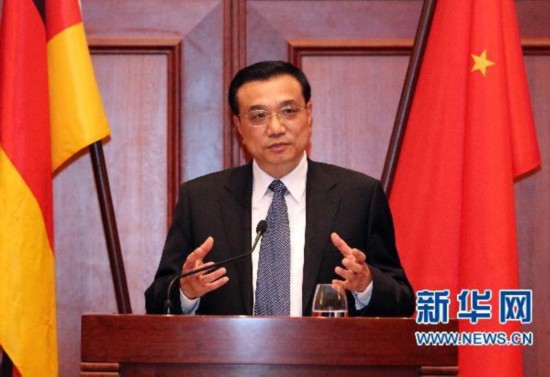李克強:中國同世界共成長
The world should not fear a growing China
|
 |
| File photo: China's vice-premier Li Keqiang |
英國《金融時報》刊發(fā)了李克強副總理的題為《中國同世界共成長》的文章����。以下為全文:
| 中國始終不渝走和平發(fā)展道路的思想源遠流長��。早在2000多年前���,中國古代著名詩集《詩經(jīng)》中就寫道:“民亦勞止�,訖可小康;惠此中國�,以綏四方”。大意為���,百姓辛苦�����,應(yīng)休養(yǎng)生息,享受安康���;這既造福于中國人民�,也有益于天下安寧��。而今天的“小康”是指:人們學(xué)有所教�、勞有所得、病有所醫(yī)�����、老有所養(yǎng)���、住有所居�,生活溫飽有余而充裕。全面建成小康社會����,是中國到2020年的發(fā)展目標。中國人民既期盼自己幸福安康�,也希望邦鄰和諧。中國的發(fā)展����,需要市場、資源等方面國際合作����,更需要和平的外部環(huán)境。世界和平是中國實現(xiàn)小康的重要條件�����,中國發(fā)展了也有利于世界和平����。 |
There is a long history to China's pursuit of the path of peaceful development. The Book of Songs, a collection of Chinese poems and songs compiled more than 2,000 years ago, reads, "Give relief to people who have toiled much, so they may enjoy a life of Xiaokang. Promote it (Xiaokang) throughout the Central Kingdom and peace will be secured for all the four quarters." What it means is, when people work too hard, they should be given relief so that they may lead a comfortable life. Doing so benefits the people of China – and the world. The term "Xiaokang" is used today to refer to a society where people can receive education, get paid through work, have access to medical services and old-age support, have a shelter and more than enough food and clothing and lead a well-off life. To build a Xiaokang society in all respects is China's development goal by 2020. The Chinese people both long for a happy and peaceful life for ourselves and hope to enjoy harmonious relations with our neighbours. China's development calls for international co-operation over access to markets and resources, and more importantly requires a peaceful external environment. World peace is an important condition for China to achieve Xiaokang, or moderate prosperity, and China's development in turn is conducive to world peace. |
| 中國的發(fā)展對其他國家是有益的。近年來���,中國經(jīng)濟增長對全球增長的貢獻率在10%-20%����,2009年達到50%。2010年中國經(jīng)濟預(yù)計增長10%左右����,商品零售總額增長18.5%,內(nèi)需對經(jīng)濟增長的貢獻率在90%以上�。內(nèi)需的擴大增加了進口。去年中國進口額預(yù)計超過1.39萬億美元���,居世界第二。我們需要穩(wěn)定和拓展外需�,更致力于擴大內(nèi)需。中國人口占世界1/5���,國內(nèi)市場潛力巨大�����。我們歡迎世界各國有競爭力的產(chǎn)品和服務(wù)進入中國市場�,并將為各國投資者提供更加公平透明的創(chuàng)業(yè)環(huán)境���。 |
China's development benefits other countries. For the past few years, China has contributed 10-20 per cent to world economic growth. Its contribution in 2009 was 50 per cent. Estimates show that in 2010 China's economy grew by about 10 per cent, and retail sales rose by 18.5 per cent. Domestic demand contributed more than 90 per cent to China's growth. At the same time, expanding domestic demand has increased China's imports. It is estimated that in 2010 China's imports from other parts of the world may well top US$1,390 bln, ranking the second in the world. China needs to stabilise and expand external demand. At the same time, and more important, it will boost domestic demand. With its population making up one fifth of the world's total, China offers a market with enormous potential. We welcome the entry into our market of competitive goods and services from around the world, and will provide a fair and even more transparent environment for foreign investors. |
| 中國愿與各國攜手解決能源資源這一全球性難題�����。過去五年���,我們堅持節(jié)約優(yōu)先����,單位國內(nèi)生產(chǎn)總值能耗下降20%左右���。今后五年��,我們將大力發(fā)展綠色經(jīng)濟��、低碳技術(shù)��,努力使單位國內(nèi)生產(chǎn)總值能耗�、單位國內(nèi)生產(chǎn)總值二氧化碳排放繼續(xù)大幅下降����。目前中國90%以上能源消費靠國內(nèi)生產(chǎn),未來我們?nèi)詫⒘⒆銍鴥?nèi)解決能源資源問題�����,加大國內(nèi)勘探開發(fā)力度,形成一批新的能源資源戰(zhàn)略接續(xù)基地���。 |
China is committed to work with other countries for a solution to the global challenge of energy and resources. In the past five years, China has worked hard to save energy and resources. China's energy consumption per unit of gross domestic product has dropped by about 20 per cent. In the coming five years, China will vigorously develop the green economy and low-carbon technologies to bring down significantly energy consumption and CO2 emission per unit of GDP. China relies on domestic supply for more than 90 per cent of its energy consumption, and will continue to rely on domestic supply to appropriately address the issue of energy and resources. By enhancing domestic exploitation and development, China will build a new group of strategic reservoirs of energy and resources. |
|
|
|
|

